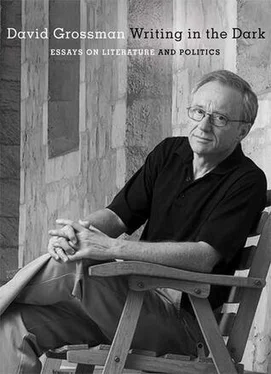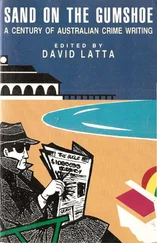David Grossman
Writing in the Dark: Essays on Literature and Politics
An unforgettable scene in Fellini’s film Roma depicts the discovery of an ancient catacomb filled with breathtaking murals. But when the murals are exposed to the spotlights of the researchers and camera crew, they fade and quickly vanish.
Explaining the process of inspiration, for me, is like trying to explain what occurs in a dream. In both cases we must resort to using words to describe an experience that by nature resists definition. In both cases we can rationally analyze the events and consider, for example, the themes and characters that may have influenced the dreamer and the needs that led him to conjure up these particular influences rather than others in his dream. But we will always feel that the essence of the dream, its secret, the unique glimmer of contact between the dreamer and the dream, remains an impenetrable riddle.
I remember what I experienced when I felt I was under the rays of a vast and inspiring literary power — when I read Kafka’s Metamorphosis , for example, or Yaakov Shabtai’s Past Continuous , or Thomas Mann’s Joseph and His Brothers . I have no doubt that some part of me, perhaps my innermost core, seemed to be in the realm of a dream. There was a similar intrinsic logic, and a direct dialogue conducted with the deepest and most veiled contents of my soul, almost without the mediation of consciousness.
When I talk, then, of this or the other author and how he or she touched my life and influenced my writing, I know that it is merely the story I tell myself today, in a waking state, under the spotlights, filtered through the natural sifting process of memory.
When I was eight years old, my father suggested that I read Sholem Aleichem’s Adventures of Mottel, the Cantor’s Son . Father himself had been a child in the Galician shtetl of Dynow, just a few miles from Lemberg, otherwise known as Lvov. Like Mottel, he had lost his father at a young age and lived with his brothers and sisters and hardworking widowed mother.
Father, who immigrated to Palestine in 1936, did not talk much about his childhood. Only rarely was the curtain drawn to reveal a strange, enchanting, intangible world, almost like a shadow theater. Then I could see my father as a little boy, sitting in the cheder opposite a stern teacher who used to fix broken china during class, binding the pieces together with wire. I could see Father at the age of four, walking home from the cheder in the dark, lighting his way with a candle stuck inside half a radish — nature’s candlestick. I could see the doctor bringing a precious remedy for my grandfather’s ailment as he lay on his deathbed: a paper-thin slice of watermelon. And I could see my father looking out the window.
Father handed me Adventures of Mottel, the Cantor’s Son (in Y. D. Berkowitz’s Hebrew translation), and I read the title of the first chapter while he held the book in his hands—“Today’s a Holiday — Weeping Is Forbidden!”—and then the following words: “I bet no one was so delighted with the warm sunny days following Passover as I, Mottel, the son of Peissi the Cantor, and as the neighbor’s calf, ‘Menie’ (as I, Mottel, have named him).”
I did not understand a word of what I read, and yet there was something there. I took the book from my father’s hands and climbed up onto the windowsill, my favorite reading place. Outside was Beit Mazmil, where the residents were trying to accustom themselves to the neighborhood’s newly ordained Hebrew name, Kiryat Yovel. It was a cluster of apartment buildings whose occupants had made their way from seventy exiles and who argued in seventy languages. The dwellers of the tinshack neighborhood, whom we called asbestonim , looked on enviously at those who were lucky enough to get a tiny apartment in one of the buildings. There were young couples who confronted life with determined optimism, and Holocaust survivors who walked the streets like shadows and whom we children feared.
“Together we basked in the first warm sunrays of the first mild after-Passover days; together we breathed in the fragrance of the first tender blades of grass that burst through the newly bared earth; and together we crept out of dark narrow prisons to greet the first sunny spring morning. I, son of Peissi the Cantor, emerged from a cold damp cellar which always smells of sour dough and medicines. And Menie, the neighbor’s calf, was released from an even worse odor — a small filthy stall, dark and muddy, with crooked battered walls which let in snow in winter and rain in summer.”
“Do you like it?” my father asked. “Read, read, it’s just how things were with us.” And perhaps because of the expression on his face at that moment, I had a sudden illumination: I realized that for the first time, he was inviting me over there , giving me the keys to the tunnel that would lead from my childhood to his.
It was a peculiar tunnel. One end was in Jerusalem, in the young State of Israel, which believed that its strength depended partly on its ability to forget so that it could cobble together a new identity for itself. And the other end was in the land of Over There.
From the moment I stepped into that land I could not leave. I was eight, and within a few months I had devoured all of Sholem Aleichem’s writings that existed in Hebrew at the time — the children’s stories, the writings for adults, and the plays. When I reread the works before writing this piece, I was amazed to discover how little I could have understood as a child, and how powerfully the things beyond the visible text must have worked on me. Because what could an eight- or nine-year-old have understood about Rachel’s tormented love for Stempenyu? Or the political views that Sholem Aleichem gave to a detached and wayward Jewish character like Menachem Mendel, or to his complete opposite, Tevye the Milkman? What did I know about the life of yeshiva students who ate at the table of a different homeowner each day of the week? About the hostility between the “landlord” class and the workers, or about the conflict between the Zionists and the Bundists?
I did not know, I did not understand, but something inside me would not allow me to let go of the inscrutable stories, written in a Hebrew I had never encountered before. I read like someone entering a completely foreign world that was, at the same time, a promised land. In some sense, I felt that I was coming home. And it all worked its magic on me in a muddled way: the words with the biblical ring, the characters, the customs, the ways of life, and the fact that the page numbers were marked with letters rather than numbers, as in Bialik and Rawnitzky’s Book of Legends . Even the smell of the pages was dense and so different from the scent of the other books I read — translations of The Famous Five and The Secret Seven, The Paul Street Boys and Kajtu  the Wizard , the works of Erich Kestner and Jules Verne, and Israeli books like Shraga Gafni’s adventure stories, Eliezer Smoli’s Frontiersmen of Israel , the adventures of the secret agent named Oz Yaoz, books by Nachum Gutman, and anything else I could get my hands on.
the Wizard , the works of Erich Kestner and Jules Verne, and Israeli books like Shraga Gafni’s adventure stories, Eliezer Smoli’s Frontiersmen of Israel , the adventures of the secret agent named Oz Yaoz, books by Nachum Gutman, and anything else I could get my hands on.
Parenthetically I will add that I belong to a generation that was accustomed to reading texts in which they did not understand every single word. In the early 1960s we read books in archaic and poetic Hebrew; we read translations from the 1920s and ’30s that did not employ our daily language at all. The incomprehensibility imposed on us was certainly a barrier to fluid reading, but in hindsight I think that part of my reading experience in that period came from this very same incomprehensibility: the mystery and the exoticism of words with an odd ring, and the pleasure of inferring one thing from another. I note this because most children’s books today (and children’s magazines even more so) are written at the readers’ eye level and ear level, if not lower, usually preferring the simplest — and sometimes the most simplistic — words possible, often favoring slang. Of course this has many advantages and perhaps results in a broader readership, yet I miss the reading experience of my own childhood, when in the course of reading, the child would fill in linguistic gaps and unwittingly acquire a large and rich vocabulary, learning to view language as an entity with a life of its own.
Читать дальше

 the Wizard , the works of Erich Kestner and Jules Verne, and Israeli books like Shraga Gafni’s adventure stories, Eliezer Smoli’s Frontiersmen of Israel , the adventures of the secret agent named Oz Yaoz, books by Nachum Gutman, and anything else I could get my hands on.
the Wizard , the works of Erich Kestner and Jules Verne, and Israeli books like Shraga Gafni’s adventure stories, Eliezer Smoli’s Frontiersmen of Israel , the adventures of the secret agent named Oz Yaoz, books by Nachum Gutman, and anything else I could get my hands on.










